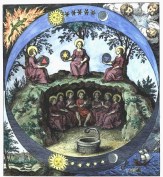
Musaeum Hermeticum
Encyclopedia

Alchemy
Alchemy is an influential philosophical tradition whose early practitioners’ claims to profound powers were known from antiquity. The defining objectives of alchemy are varied; these include the creation of the fabled philosopher's stone possessing powers including the capability of turning base...
texts first published in German
German language
German is a West Germanic language, related to and classified alongside English and Dutch. With an estimated 90 – 98 million native speakers, German is one of the world's major languages and is the most widely-spoken first language in the European Union....
, in Frankfurt
Frankfurt
Frankfurt am Main , commonly known simply as Frankfurt, is the largest city in the German state of Hesse and the fifth-largest city in Germany, with a 2010 population of 688,249. The urban area had an estimated population of 2,300,000 in 2010...
, 1625 by Lukas Jennis. Additional material was added for the 1678 Latin
Latin
Latin is an Italic language originally spoken in Latium and Ancient Rome. It, along with most European languages, is a descendant of the ancient Proto-Indo-European language. Although it is considered a dead language, a number of scholars and members of the Christian clergy speak it fluently, and...
edition, which in turn was reprinted in 1749.
Its purpose was apparently to supply in a compact form a representative collection of relatively brief and less ancient alchemical writings; it could be regarded as a supplement to those large storehouses of Hermetic learning such as the Theatrum Chemicum
Theatrum Chemicum
Theatrum Chemicum , is a compendium of early alchemical writings published in six volumes over the course of six decades. The first three volumes were published in 1602, while the final sixth volume was published in its entirety in 1661...
, or Jean-Jacques Manget
Jean-Jacques Manget
Jean-Jacques Manget was a Swiss physician and writer. He was an assiduous compiler of previous medical literature.He wrote in particular a major treatise on the bubonic plague...
's "Bibliotheca Chemica Curiosa". It seemed to represent a distinctive school in Alchemy, less committed to the past and less obscure than the works of older and more traditional alchemical masters.
The full Latin
Latin
Latin is an Italic language originally spoken in Latium and Ancient Rome. It, along with most European languages, is a descendant of the ancient Proto-Indo-European language. Although it is considered a dead language, a number of scholars and members of the Christian clergy speak it fluently, and...
title is: "Musæum Hermeticum, omnes sopho-spagyricæ artis discipulos fidelissime erudiens, quo pacto summa illa veraque Medicina, qua res omne, qualemcumque defectum patientes, instaurari possunt (quæ alias Benedictus Lapis Sapientum appellatur) inveniri ac haberi queat inveniri ac haberi queat. Continens tractatus chymicos novem præatantissimos, quorum nomina et seriem versa pagella indicabit. In gratiam filiorum doctrinæ, quibus Germanicum Idioma ignotum, in Latinum conversum ac juris publici factum.
Jennis"
The first edition contained:
-
- The Remonstrances of Nature ascribed to Jean de Meung
- The Twelve Keys of Basil Valentine
- Subtle Allegory (Michael MaierMichael MaierMichael Maier was a German physician and counsellor to Rudolf II Habsburg, a learned alchemist, epigramist and amateur composer.- Biography :...
)- Three Treatise of PhilalethesEirenaeus PhilalethesEirenaeus Philalethes was a 17th century alchemist and the author of many influential works. These works were read by such luminaries as Isaac Newton, John Locke, and Gottfried Wilhelm Leibniz...
- The Book of Alze
- Open Entrance to the Closed Palace - PhilalethesEirenaeus PhilalethesEirenaeus Philalethes was a 17th century alchemist and the author of many influential works. These works were read by such luminaries as Isaac Newton, John Locke, and Gottfried Wilhelm Leibniz...
- A Tract of Great Price
- The Only True Way
- The Testament of Cremer
- The Glory of the World
- The Waterstone of the Wise
- The Golden Tract concerning the Philosopher's Stone
- Three Treatise of Philalethes
The illustrated book contains 445 + 35 pages.
External links
- Musaeum hermeticum etc. (1625 German edition)
- Musaeum hermeticum etc. (1678 Latin edition)
- The Hermetic Museum, restored and enlarged (English A. E. Waite edition, 1898)
- Musaeum Hermeticum etc. (English translation at "The Alchemy Website")

